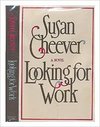

Klik op een omslag om naar Google Boeken te gaan.
|
Bezig met laden... Werk zoekendoor Susan Cheever
 Geen Bezig met laden...
Meld je aan bij LibraryThing om erachter te komen of je dit boek goed zult vinden. Op dit moment geen Discussie gesprekken over dit boek.   ) )geen besprekingen | voeg een bespreking toe
Onderdeel van de uitgeversreeks(en)Grote ABC (569)
Geen bibliotheekbeschrijvingen gevonden. |
Actuele discussiesGeen
 Google Books — Bezig met laden... Google Books — Bezig met laden...GenresDewey Decimale Classificatie (DDC)813.5Literature English (North America) American fiction 20th CenturyLC-classificatieWaarderingGemiddelde: (3.06) (3.06)
Ben jij dit?Word een LibraryThing Auteur. |
|||||||||||||||||||||||||||||||||||||||||||||||||||||||||||||||||||||||||||||||||||||||||||||||||||||||